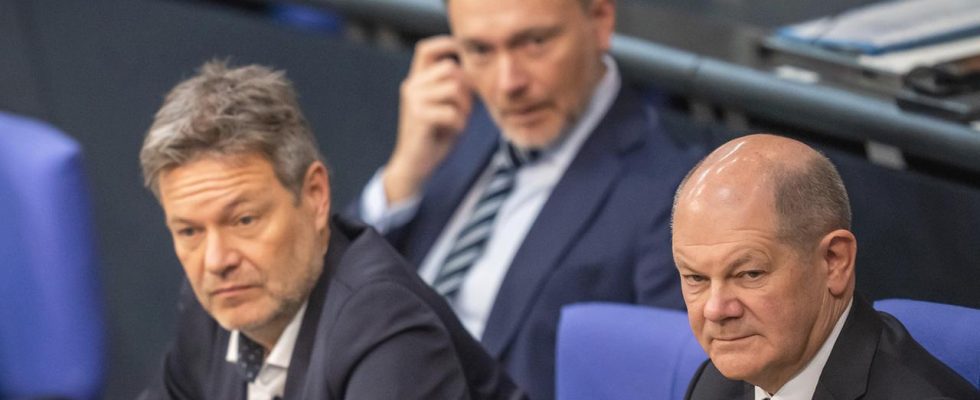The traffic light coalition is missing billions in the 2024 budget – and there is no time to calmly look for ways out of the budget crisis. Demands and “red lines” complicate negotiations. In focus: Citizens’ money and the debt brake.
The traffic light leaders don’t have much time left to get the 2024 budget in place on time this year. For days, Chancellor Olaf Scholz (SPD), Vice Chancellor Robert Habeck (Greens) and Finance Minister Christian Lindner (FDP) have been struggling behind closed doors to find ways out of the billion dollar hole in the budget. Lindner puts it at 17 billion euros. If there is no political agreement on principles and no budget resolution for 2024 this year, there would be a provisional budget management in January and February. Then, for the time being, only expenses that are necessary to maintain administration and fulfill legal obligations are possible. A scenario that the traffic light coalition wants to prevent.
There are some savings proposals on the table – which are being controversially discussed between the SPD, the Greens and the FDP.
FDP insists on changes to citizens’ money
Lindner identified social issues as one area of savings, including citizens’ money. And the FDP doesn’t let up and points to the fact that inflation has now fallen sharply. Despite the no vote from Social Affairs Minister Hubertus Heil, the Liberals insist on changes to the planned increase in citizens’ benefits. As of January 1, 2024, the five million or so recipients of citizens’ benefit will receive an average of around 12 percent more money. There were also calls from the Union to stop the increase.
The calculation method dates back to the days of Hartz IV – that is long outdated, said FDP parliamentary group leader Christian Dürr to the “Bild” newspaper. He thought it would be right to also talk about the calculation of citizens’ allowance during the budget discussions. It must be carefully examined “whether the wage gap requirement can be maintained using the old calculation method”. Anyone who works should always have more money left over than someone who doesn’t.
Greens: No cuts in citizens’ benefits
The Green Party’s budget policy spokesman, Sven-Christian Kindler, maintained his stance NDR info against: There are no plans to change the calculations for citizens’ money. That wouldn’t make any sense. The high inflation in 2022/2023 particularly affected people in poverty. Food costs in particular have increased. The inflation development must be caught up. People who receive citizen’s benefit in particular need support. Cuts are not the right way here.
Kindler emphasized that we should rather talk about reforming the debt brake. “We should not abolish the debt brake, but rather strengthen it now and add an investment rule.”
CDUEmployee wing: No discussion about social cuts
However, calls from the party leadership to cut social benefits are also met with criticism in parts of the CDU. “The discussions about social cuts must be ended immediately,” said Christian Bäumler, deputy federal chairman of the workers’ wing CDA, to the “taz”.
Party leader Friedrich Merz’s demand for a suspension of the citizen’s benefit increase only unsettles people and does not stabilize the economy. The problem is not the amount of citizens’ money, but rather the salaries in the low-wage sector. The CDA is therefore calling for an increase in the minimum wage to 60 percent of the median income, currently 14 euros per hour. It is currently 12 euros per hour and is expected to rise to 12.41 euros on January 1st.
Bäumler also appeared open to creating a new framework for investments in the federal budget. The CDA is currently discussing strategies on how this could be achieved. “We can imagine supplementing the debt brake with a special climate protection fund,” explained Bäumler. “We need regulations that enable investments in Germany by 2025 at the latest.”
SPD: Suspend the debt brake
SPD leader Saskia Esken continues to push for the debt brake to be suspended again for 2024. She argued in the “Stuttgarter Zeitung” and the “Stuttgarter Nachrichten” that Germany will continue to incur direct and indirect costs from the Russian war against Ukraine. These cannot easily be covered from the normal budget. “The constitution doesn’t expect us to do that at all. The exception to the debt brake is also part of the constitution,” emphasized Esken.
The debt brake is to be suspended again for the current year in order to prevent the budget from becoming unconstitutional. The Bundestag Budget Committee wants to question experts about this today. The Federal Audit Office previously expressed doubts about the constitutionality of the supplementary budget.
Red lines of the FDP
The negotiations within the traffic light are also complicated because the FDP has formulated “red lines”. “The debt brake is set for 2024 and there will be no tax increases,” said FDP budget expert Christoph Meyer to the AFP news agency. “These two lines are well known and anchored in the coalition agreement.” The calls for a renewed suspension of the debt brake for 2024 are also met with criticism. “You can’t arbitrarily construct an emergency situation and increase the national debt just because the state has to limit its spending,” said Meyer.
Because of the billion-dollar holes in the budget, many now fear massive cuts – including climate activists, municipalities and police officers. The German Association of Cities and Municipalities called for exceptions to the debt brake for “important generational tasks such as climate protection and infrastructure”. The police union (GdP) warned of savings in the security sector.

